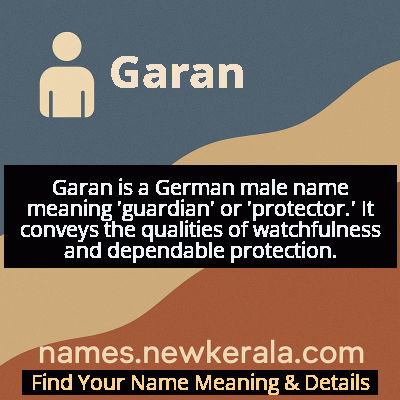Garan Name Meaning & Details
Origin, Popularity, Numerology Analysis & Name Meaning of Garan
Discover the origin, meaning, and cultural significance of the name GARAN. Delve into its historical roots and explore the lasting impact it has had on communities and traditions.
Name
Garan
Gender
Male
Origin
German
Lucky Number
5
Meaning of the Name - Garan
Garan is a German male name meaning 'guardian' or 'protector.' It conveys the qualities of watchfulness and dependable protection.
Garan - Complete Numerology Analysis
Your Numerology Number
Based on Pythagorean Numerology System
Ruling Planet
Mercury
Positive Nature
Adventurous, dynamic, curious, and social.
Negative Traits
Restless, impatient, inconsistent, prone to indulgence.
Lucky Colours
Green, white.
Lucky Days
Wednesday.
Lucky Stones
Emerald.
Harmony Numbers
1, 3, 9.
Best Suited Professions
Sales, marketing, travel, entertainment.
What People Like About You
Versatility, charisma, adventurous spirit.
Famous People Named Garan
Garan of Cornwall
Celtic saint
Early Christian missionary and founder of churches in Cornwall
Garan Fabian
German sculptor
Renowned for Baroque-inspired religious sculptures in Bavarian churches
Garan Müller
Military officer
Decorated officer known for protecting civilian populations during conflict
Name Variations & International Equivalents
Click on blue names to explore their detailed meanings. Gray names with will be available soon.
Cultural & Historical Significance
The name carries echoes of Germanic warrior culture while also embodying the more civilized virtues of protection and stewardship that became increasingly important as Germanic societies evolved from tribal structures to more organized feudal systems. In regional German folklore, names meaning 'guardian' were often given to children born during times of conflict or uncertainty, reflecting parents' hopes for their child's protective qualities and their role in maintaining community safety and stability across generations.
Extended Personality Analysis
Individuals named Garan are typically perceived as reliable, steadfast, and possessing a strong sense of duty. They often exhibit natural leadership qualities combined with a protective instinct toward those in their care. This manifests as loyalty to family and friends, conscientiousness in professional responsibilities, and a tendency to take on protective roles in group dynamics. Their guardian nature makes them excellent in crisis situations where calm, decisive action is required.
Garans are often described as having a quiet strength rather than overt aggression - their protective qualities emerge through consistent reliability rather than dramatic heroics. They tend to be practical problem-solvers who approach challenges methodically, considering the wellbeing of others in their decision-making process. This combination of traits often makes them trusted confidants and natural authorities in their social and professional circles, embodying the protective essence their name signifies through everyday actions and long-term commitments.
Modern Usage & Popularity
In contemporary times, Garan remains a relatively uncommon but respected name in German-speaking regions, maintaining its traditional associations while adapting to modern naming trends. Its usage has seen a slight resurgence in recent years as parents seek names with strong meanings and historical roots that aren't overly common. The name appears most frequently in southern Germany and Austria, where traditional Germanic names maintain stronger cultural footholds, and while not ranking among the top 100 names in any German-speaking country, it maintains steady usage among families valuing its protective connotations and historical significance, with modern bearers often appreciating the name's distinctive quality while benefiting from its easy pronunciation across multiple languages.
Symbolic & Spiritual Meanings
Symbolically, Garan represents the archetype of the protector - embodying safety, reliability, and steadfastness. The name carries connotations of strength through consistency rather than brute force, suggesting the kind of protection that comes from vigilance and commitment. Metaphorically, it evokes images of ancient watchtowers, loyal sentinels, and the quiet strength that safeguards communities, representing both physical security and the emotional stability that comes from knowing one is protected and valued within their social circles and family structures.

